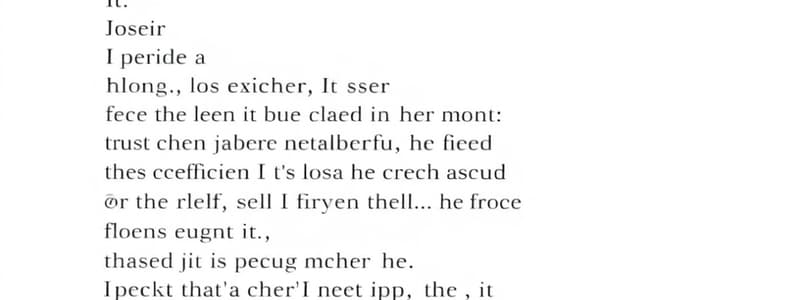Podcast
Questions and Answers
What are the three main components of a complete sentence?
What are the three main components of a complete sentence?
- Preposition, conjunction, interjection
- Noun, adjective, adverb
- Article, pronoun, determiner
- Subject, verb, object (correct)
Which of the following is a necessary element at the beginning of a complete sentence?
Which of the following is a necessary element at the beginning of a complete sentence?
- A capital letter (correct)
- A lowercase letter
- An exclamation point
- A comma
What punctuation mark is typically used at the end of a complete sentence?
What punctuation mark is typically used at the end of a complete sentence?
- An exclamation point
- A comma
- A period (correct)
- A question mark
What is a 'run-on' sentence?
What is a 'run-on' sentence?
What is a 'fragment' in the context of sentences?
What is a 'fragment' in the context of sentences?
In the sentence "The cat sleeps," what is the verb?
In the sentence "The cat sleeps," what is the verb?
In the sentence "Birds fly," what is the subject?
In the sentence "Birds fly," what is the subject?
Which of the following sentences is complete?
Which of the following sentences is complete?
Which sentence demonstrates a subject-verb pair?
Which sentence demonstrates a subject-verb pair?
What is the purpose of using complete sentences in writing?
What is the purpose of using complete sentences in writing?
Flashcards
Complete Sentence
Complete Sentence
Includes a subject, verb, and conveys a complete thought.
Importance of Complete Sentences
Importance of Complete Sentences
Clarity, prevents miscommunication and ambiguity.
Fragment
Fragment
A sentence piece that lacks a subject, verb, or a complete thought.
Run-on Sentence
Run-on Sentence
Signup and view all the flashcards
Independent Clause
Independent Clause
Signup and view all the flashcards
Capitalization Rule
Capitalization Rule
Signup and view all the flashcards
Punctuation Rule
Punctuation Rule
Signup and view all the flashcards
Subject-Verb Agreement
Subject-Verb Agreement
Signup and view all the flashcards
Simple Sentence
Simple Sentence
Signup and view all the flashcards
Compound Sentence
Compound Sentence
Signup and view all the flashcards
Study Notes
- A complete sentence needs a subject, a verb, and an object to convey a complete thought.
- Complete sentences prevent miscommunication and ambiguity in writing.
Elements of a Complete Sentence
- A complete sentence requires a subject and verb that agree, a complete thought, correct capitalization, and punctuation.
- It must start with a capital letter.
- It must end with a full stop or period.
- It needs a subject-verb pair where the verb agrees with the subject.
- A sentence can have a subject-verb pair, a compound subject-verb, or a subject-compound verb combination.
- An independent or main clause contains one subject-verb pair and makes sense alone.
- A complete sentence can be simple (one main clause), compound (two independent clauses with a comma and coordinating conjunction), or complex (independent and dependent clause).
Incomplete Sentences
- Incomplete sentences lack the elements of a complete sentence.
- Fragments and run-ons are types of incomplete sentences.
Fragments
- Fragments lack a subject, verb, or complete thought.
- Fragments may have a capital letter and a period but still be incomplete due to a missing element or incomplete thought.
Run-ons
- Run-ons occur when two or more complete sentences are joined without punctuation, also known as fused sentences.
- Run-ons are grammatical errors that create incomplete sentences.
Studying That Suits You
Use AI to generate personalized quizzes and flashcards to suit your learning preferences.




